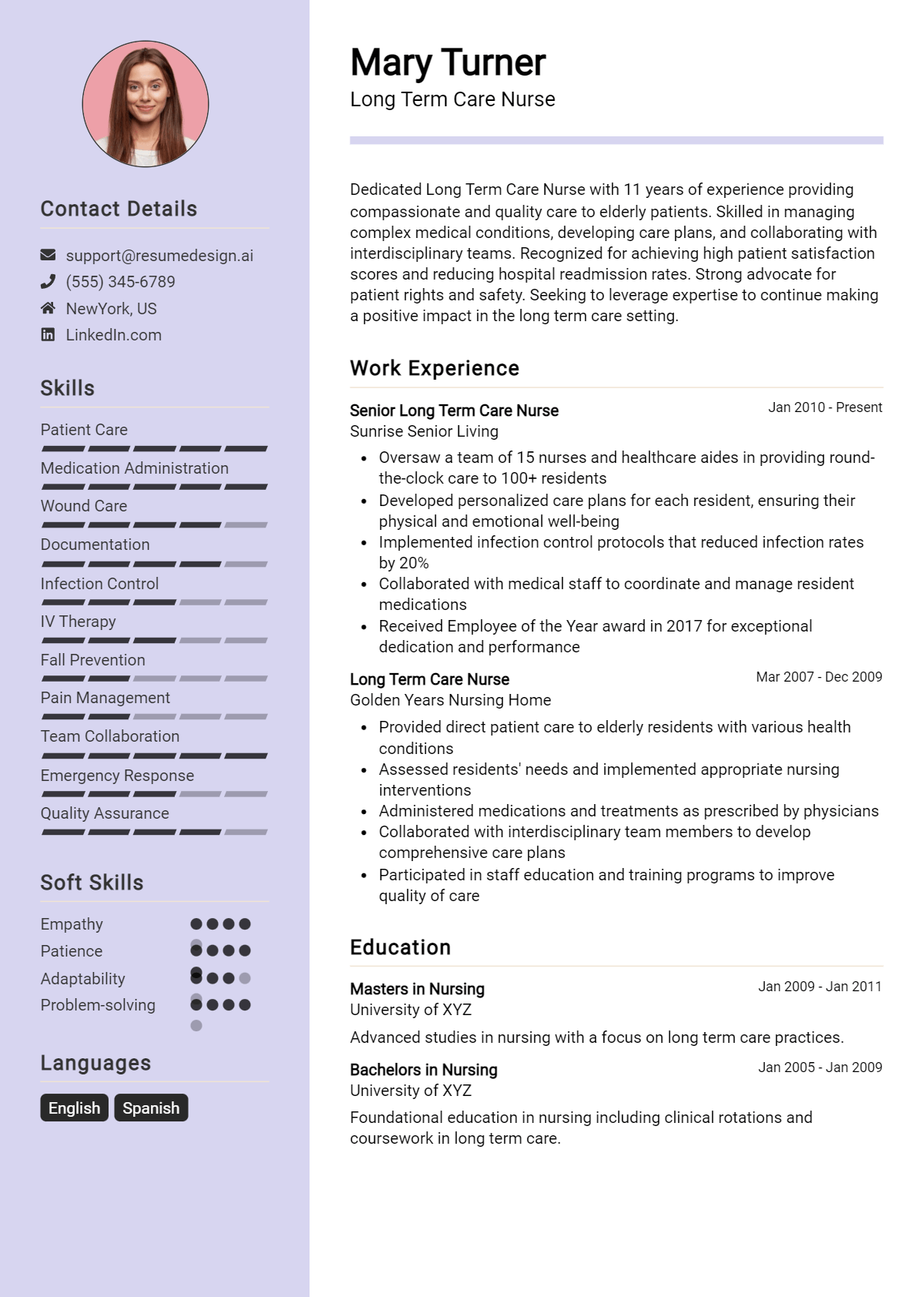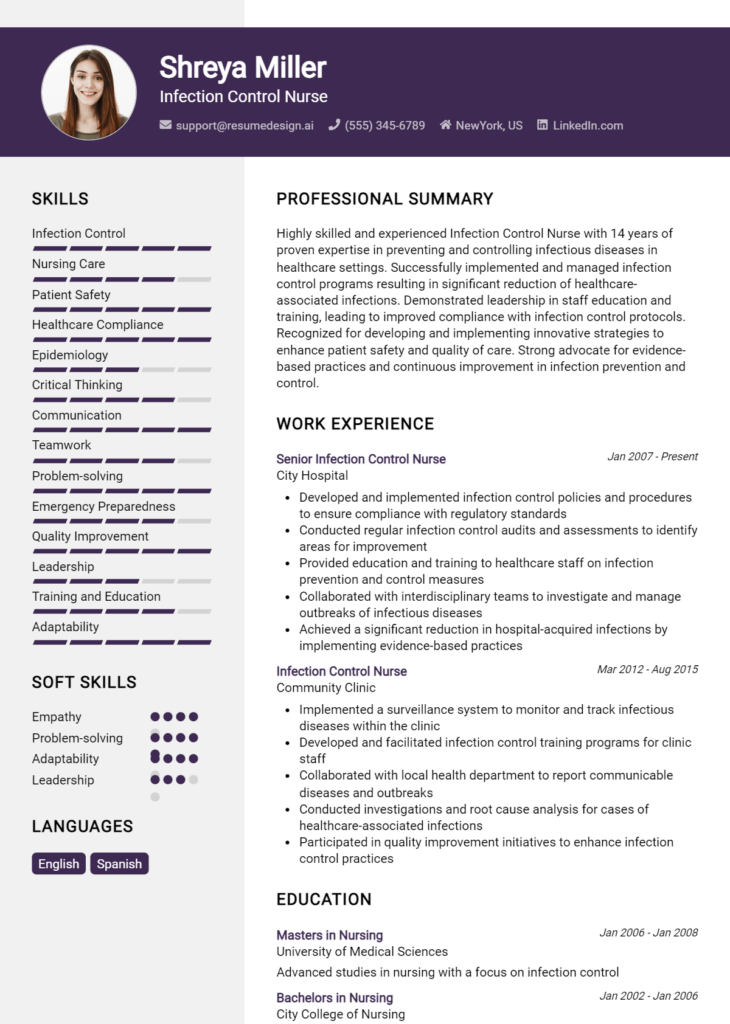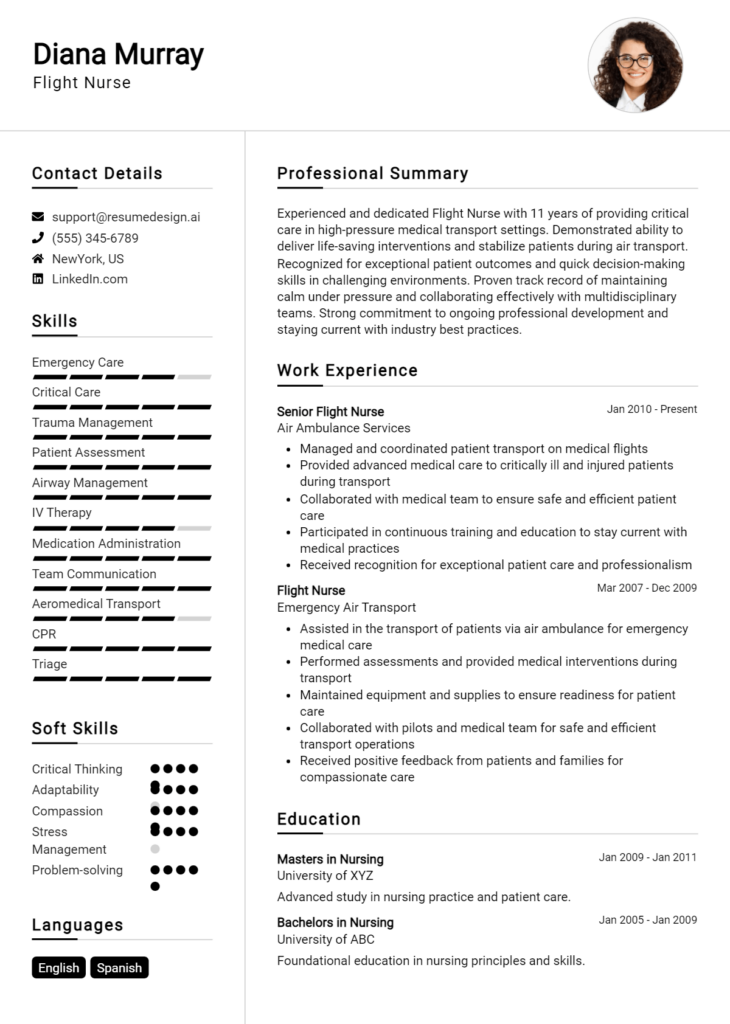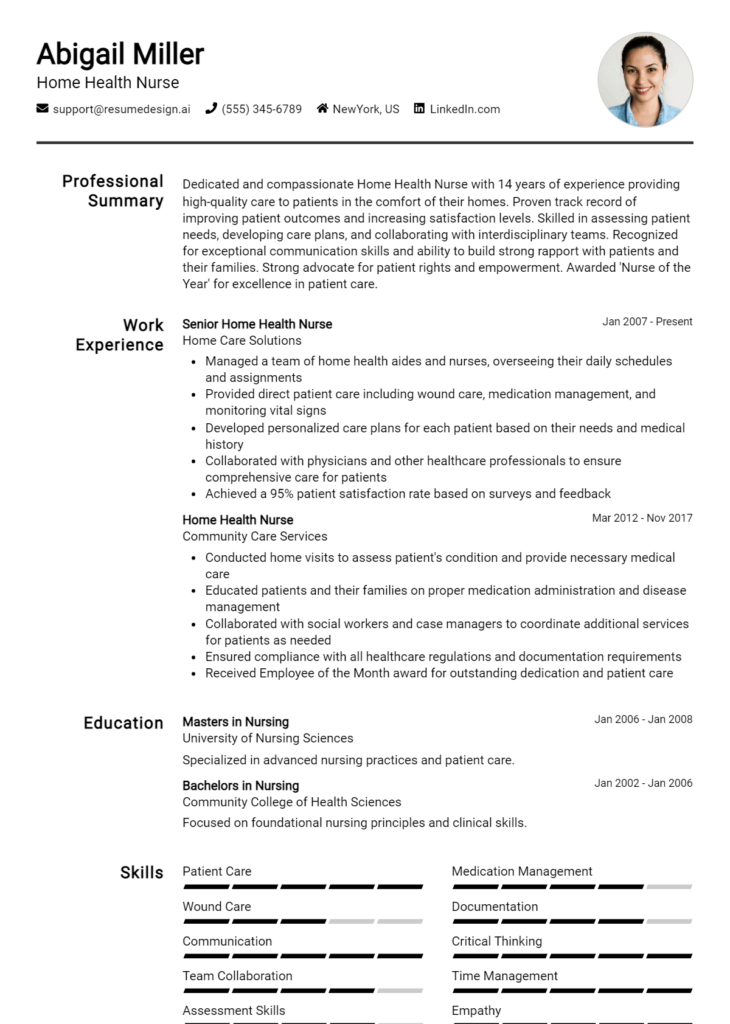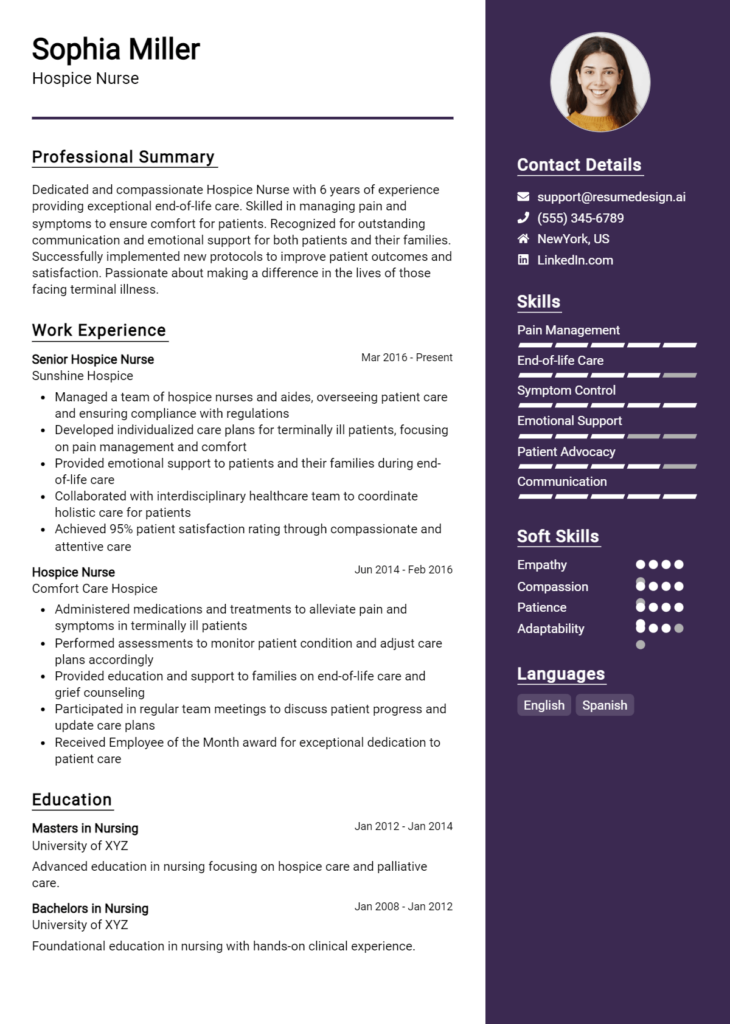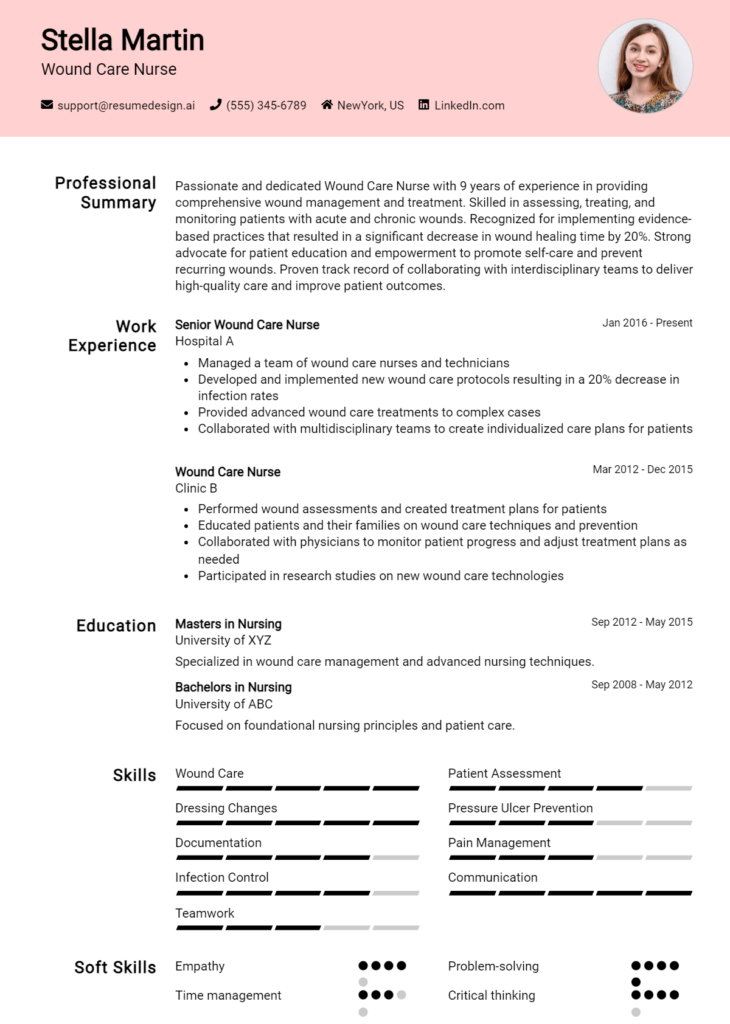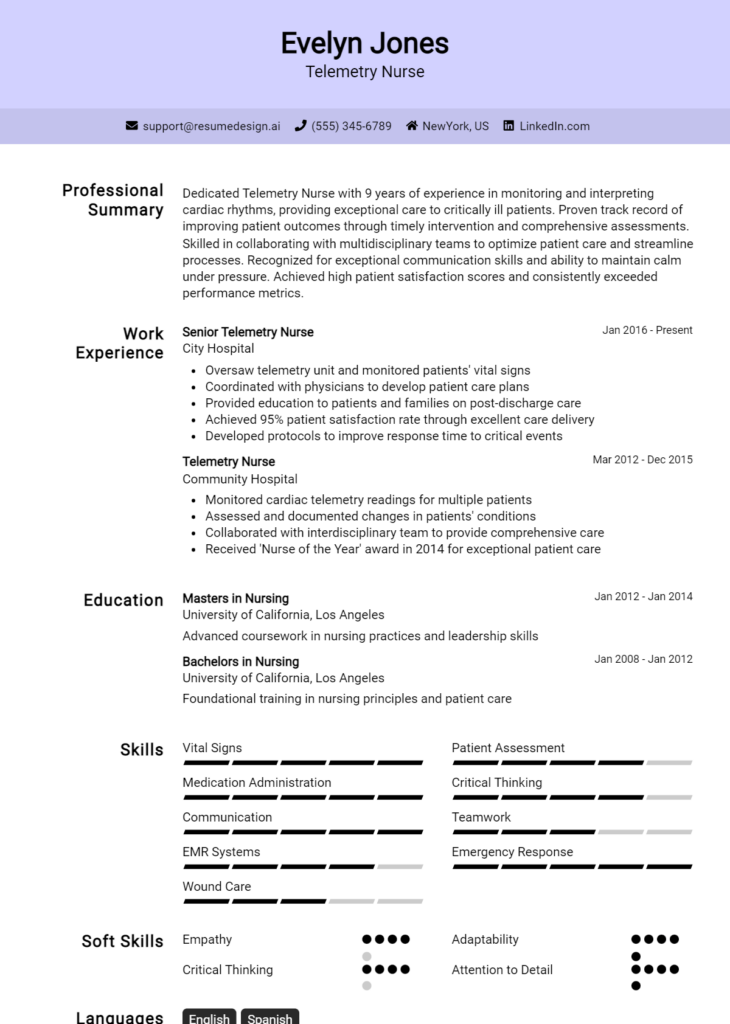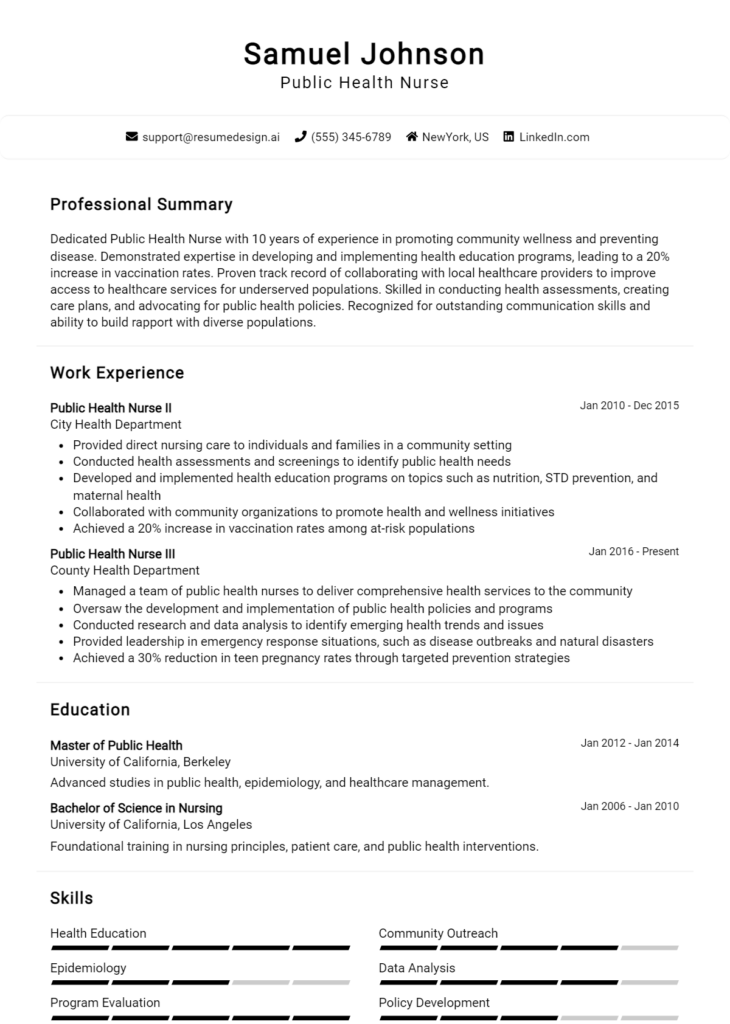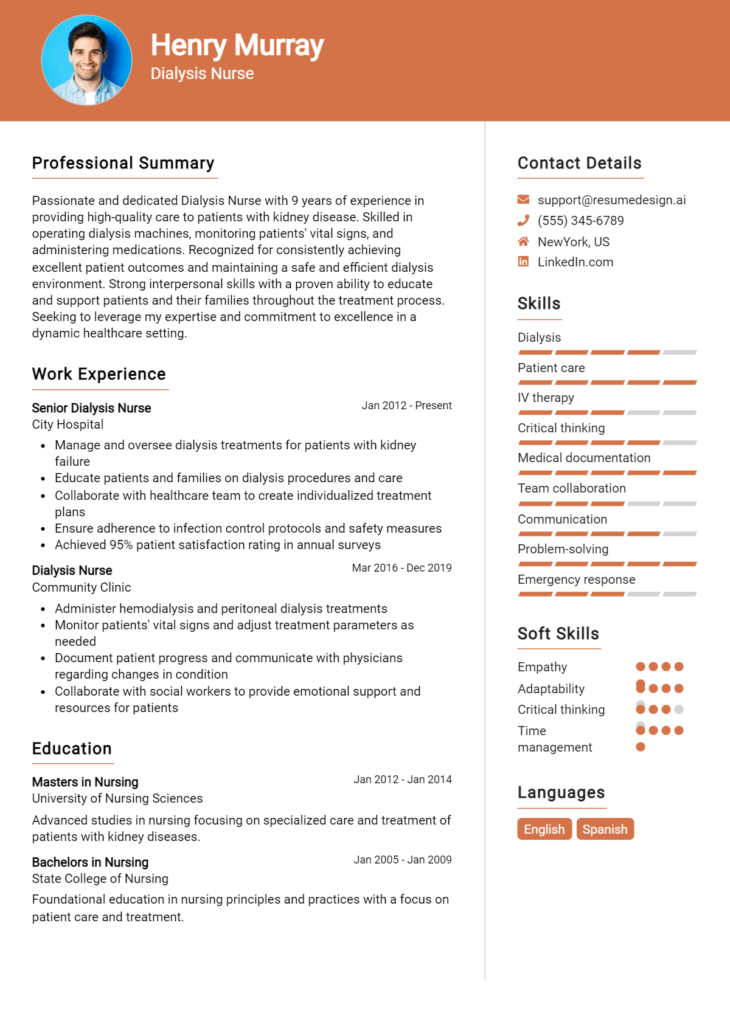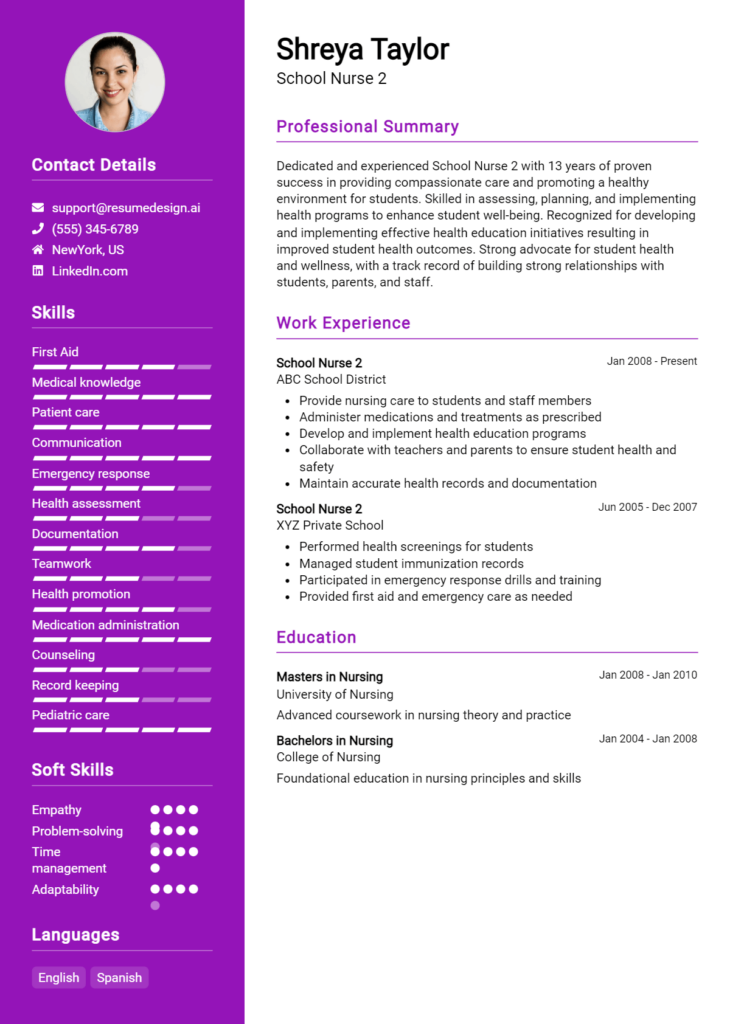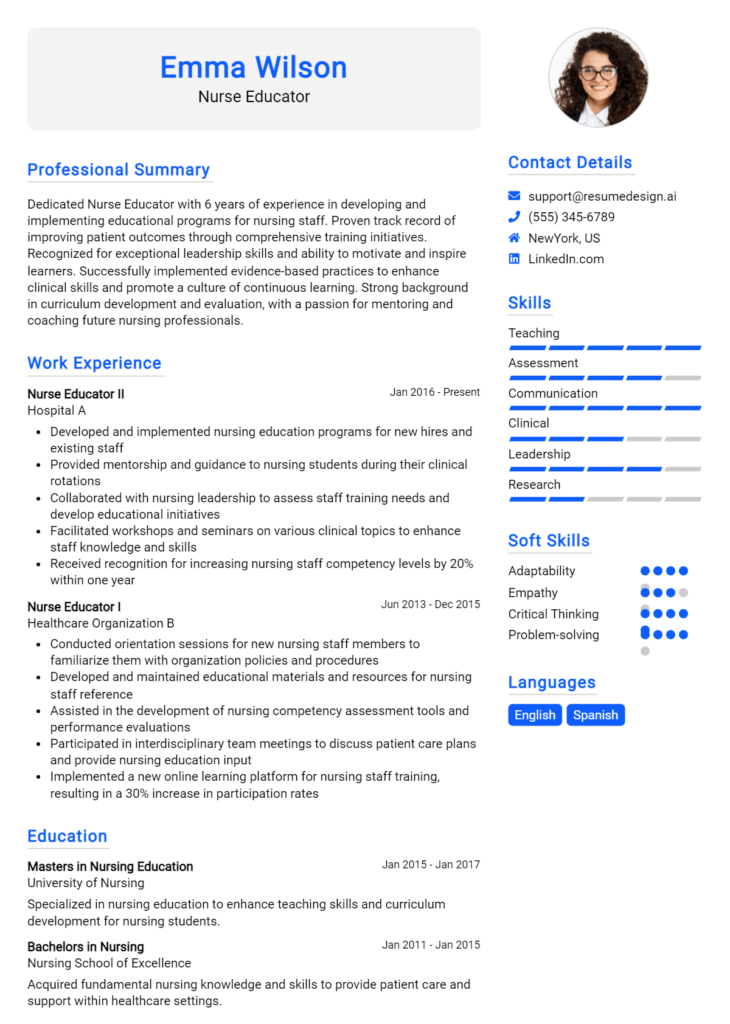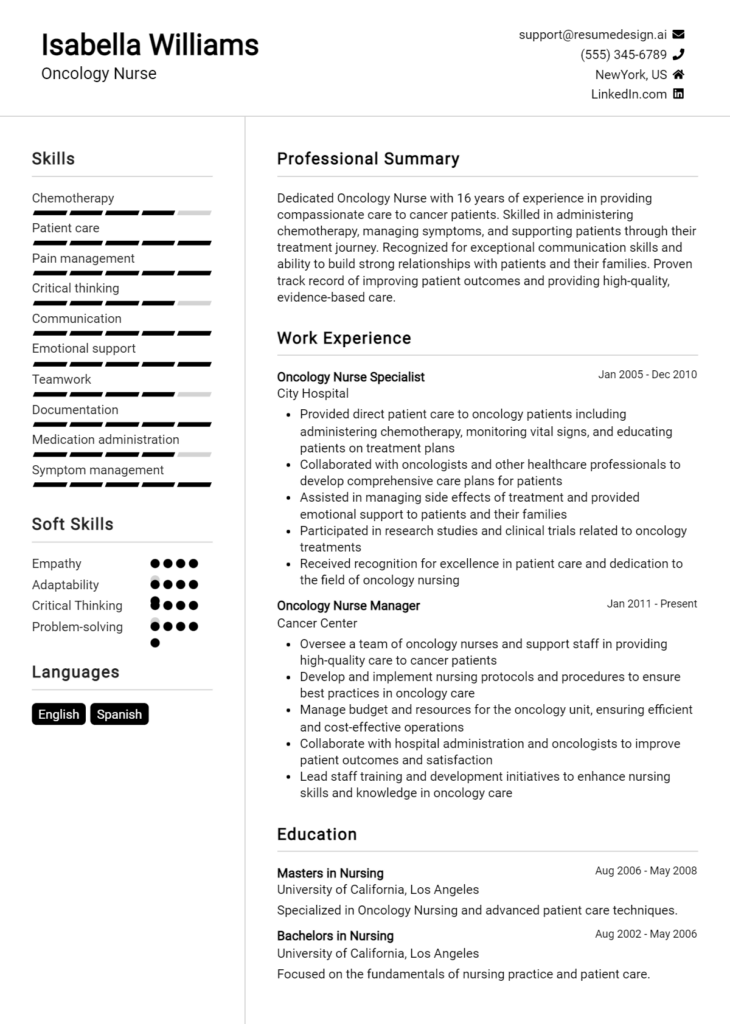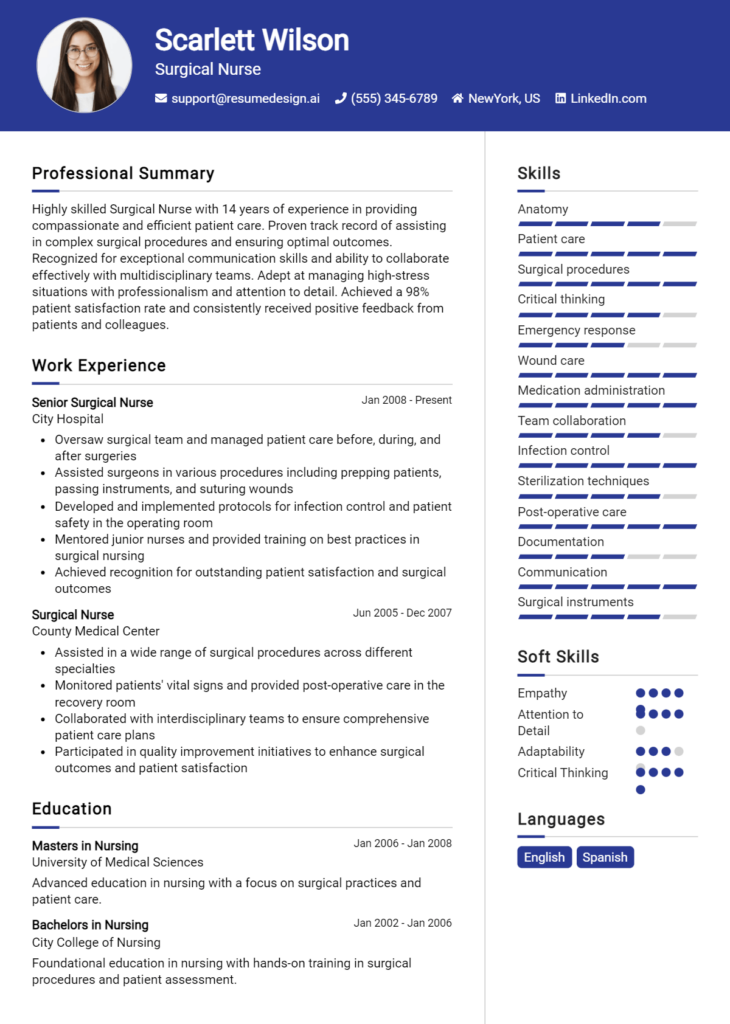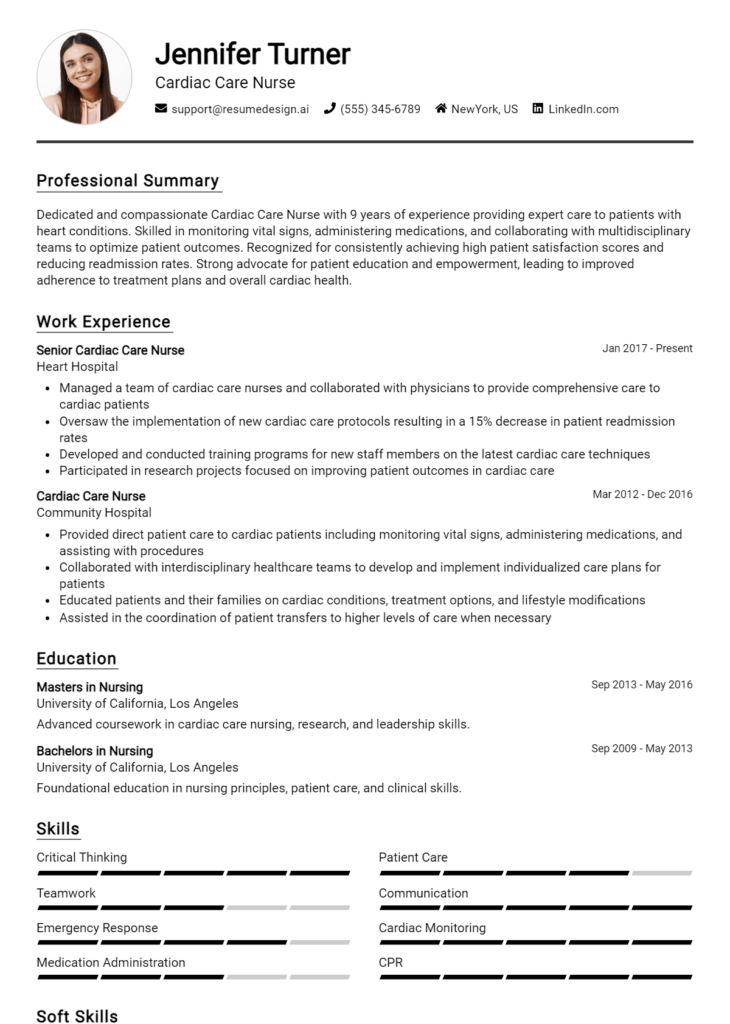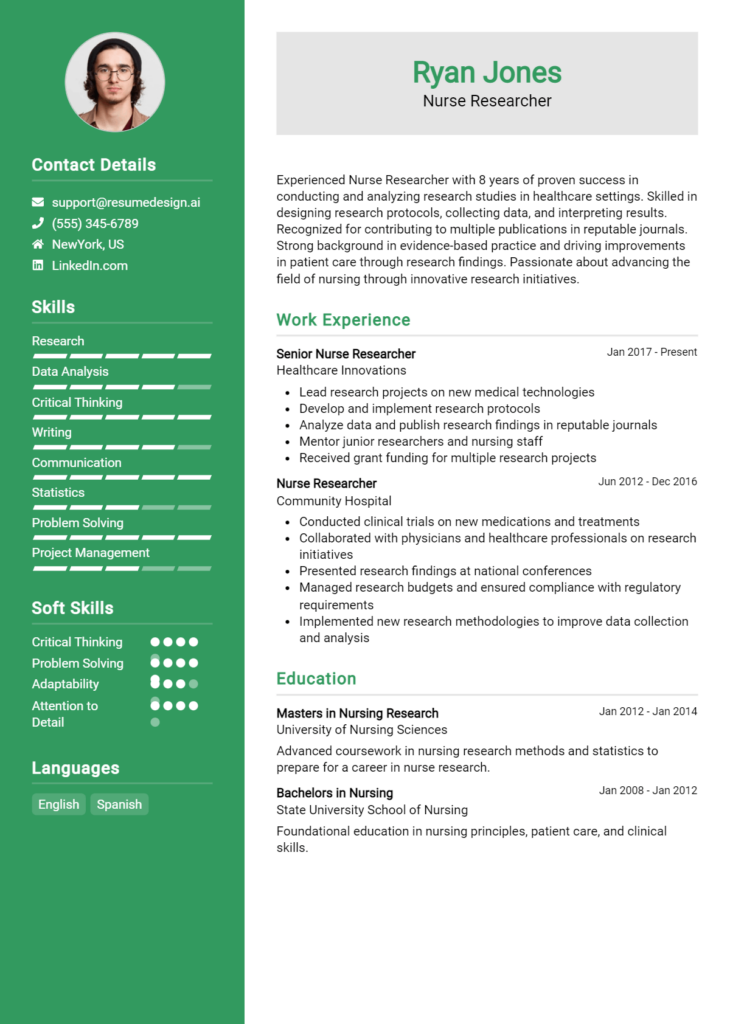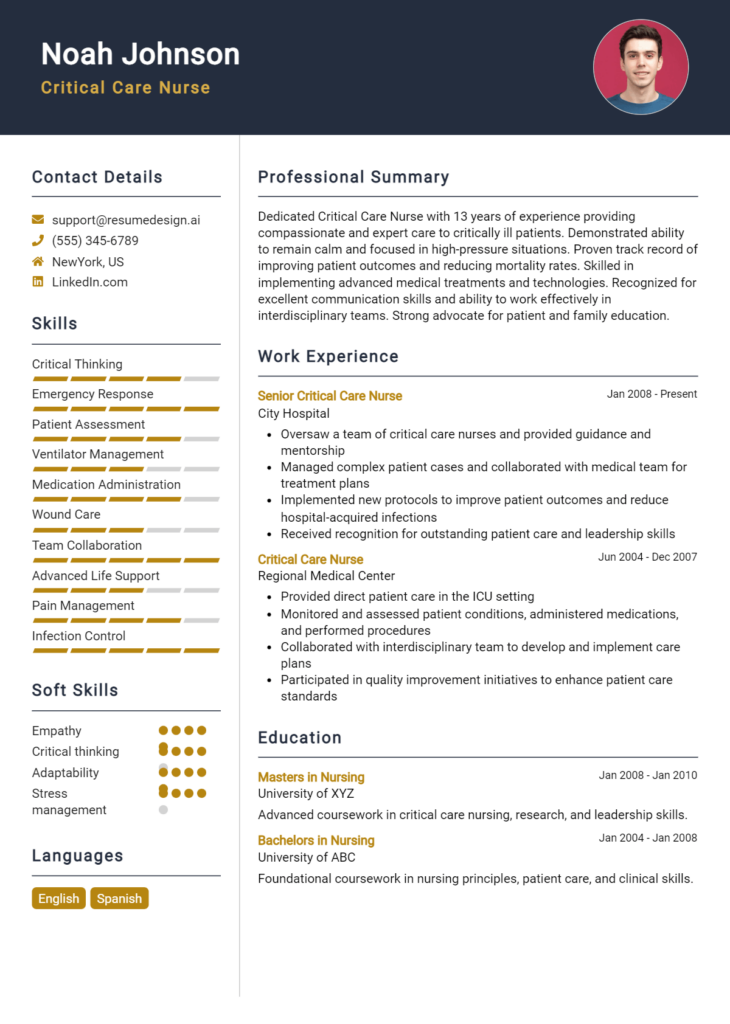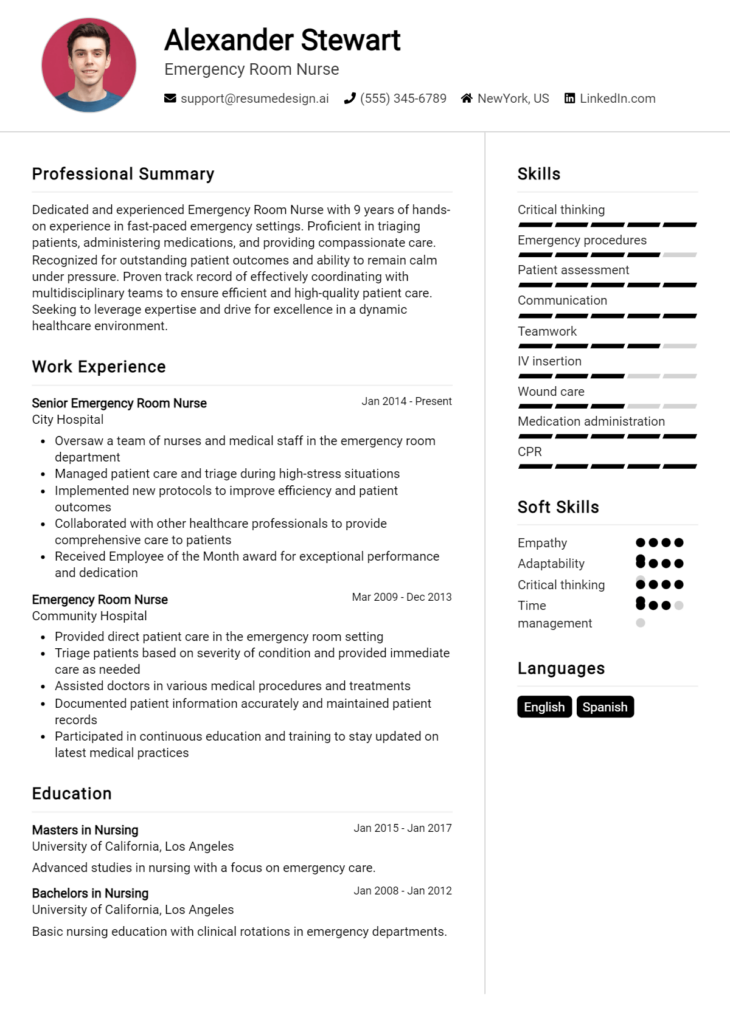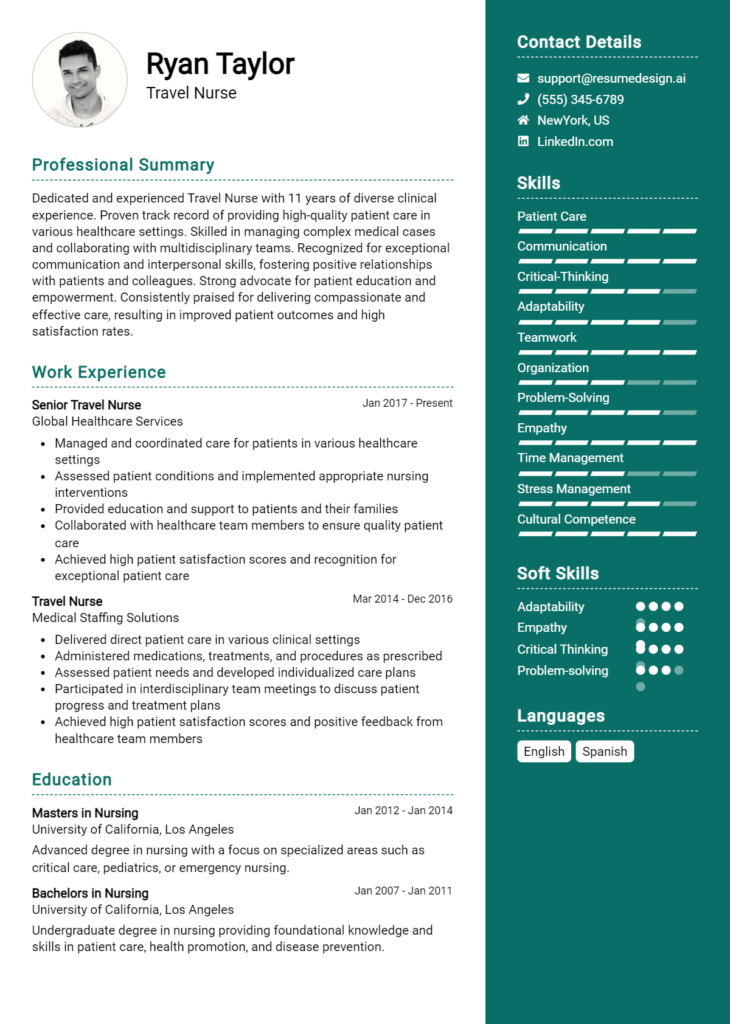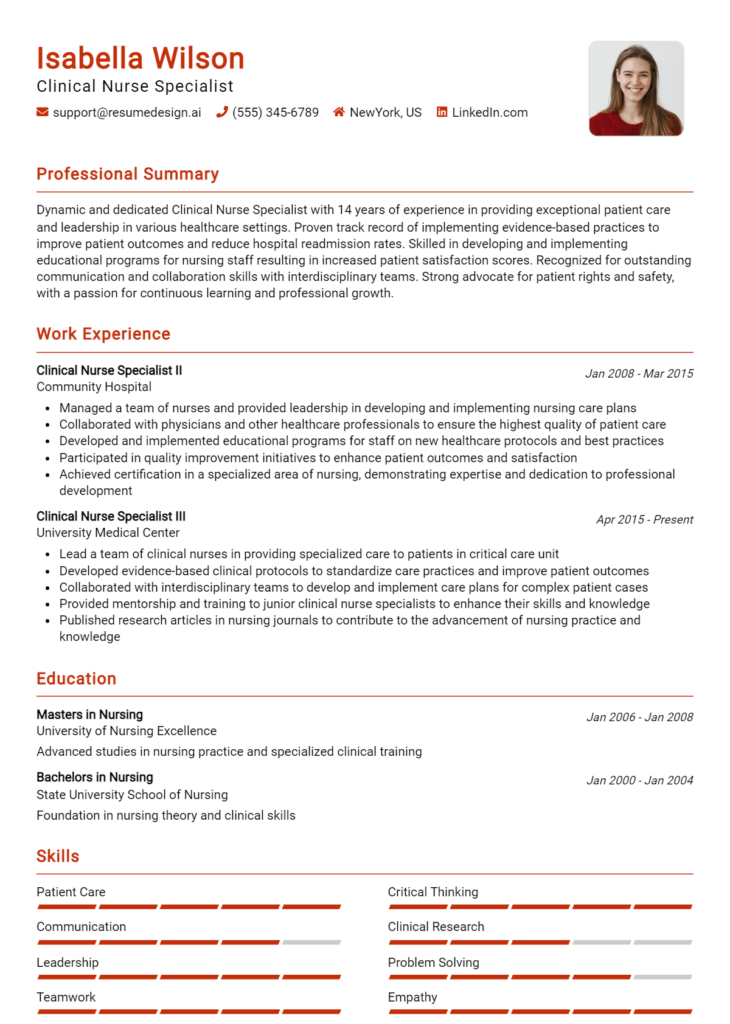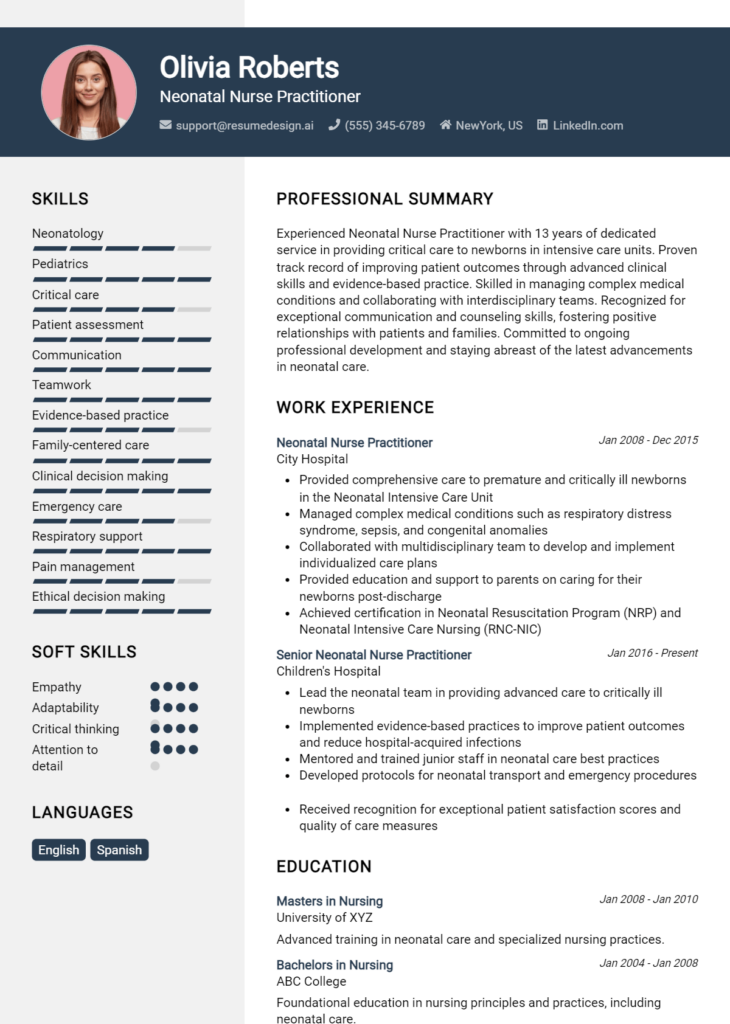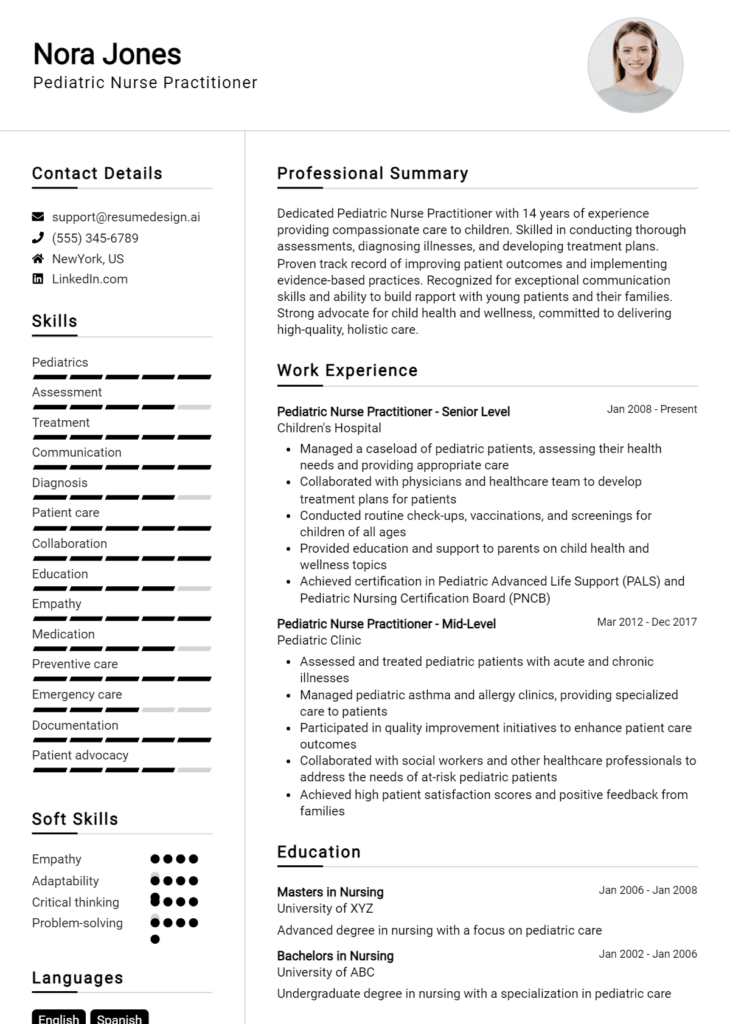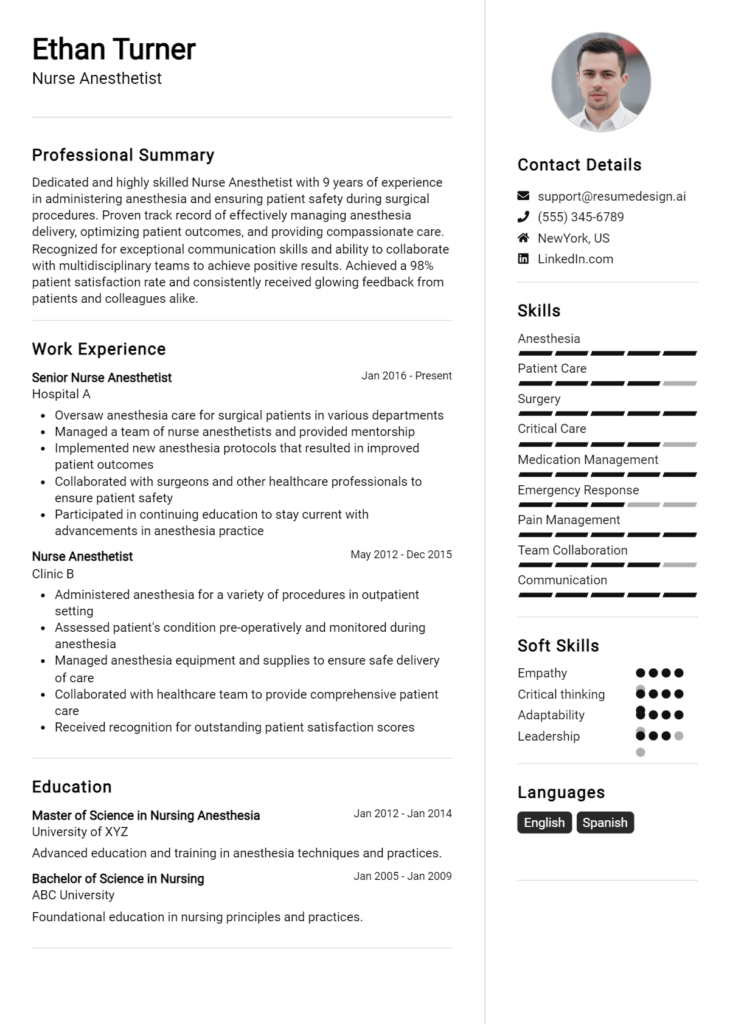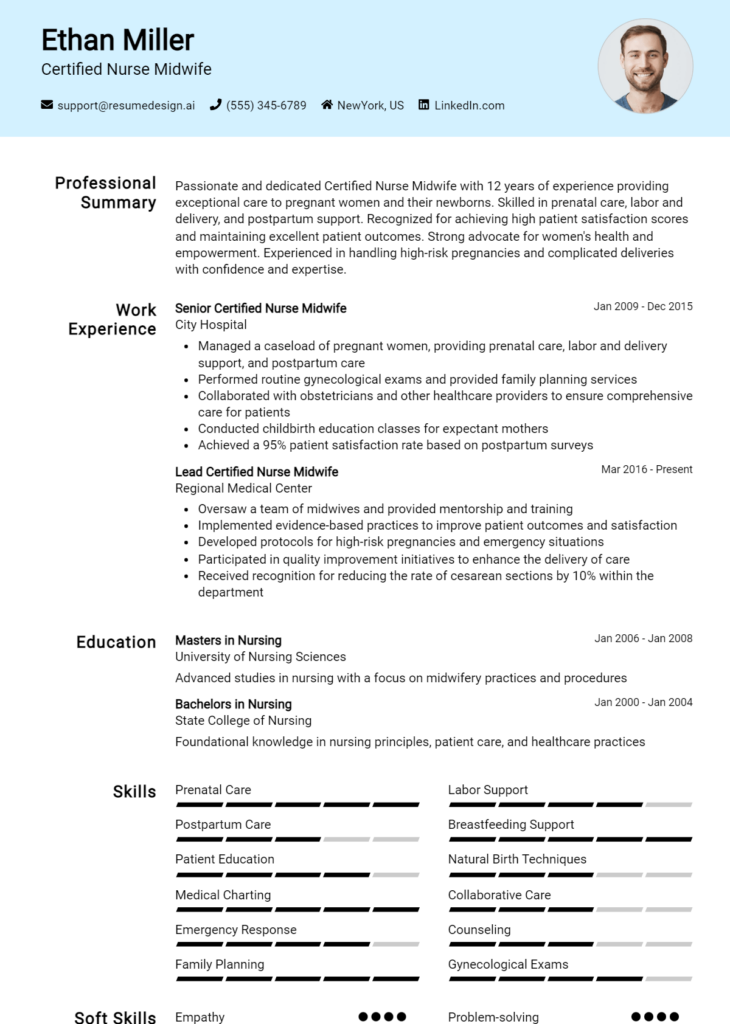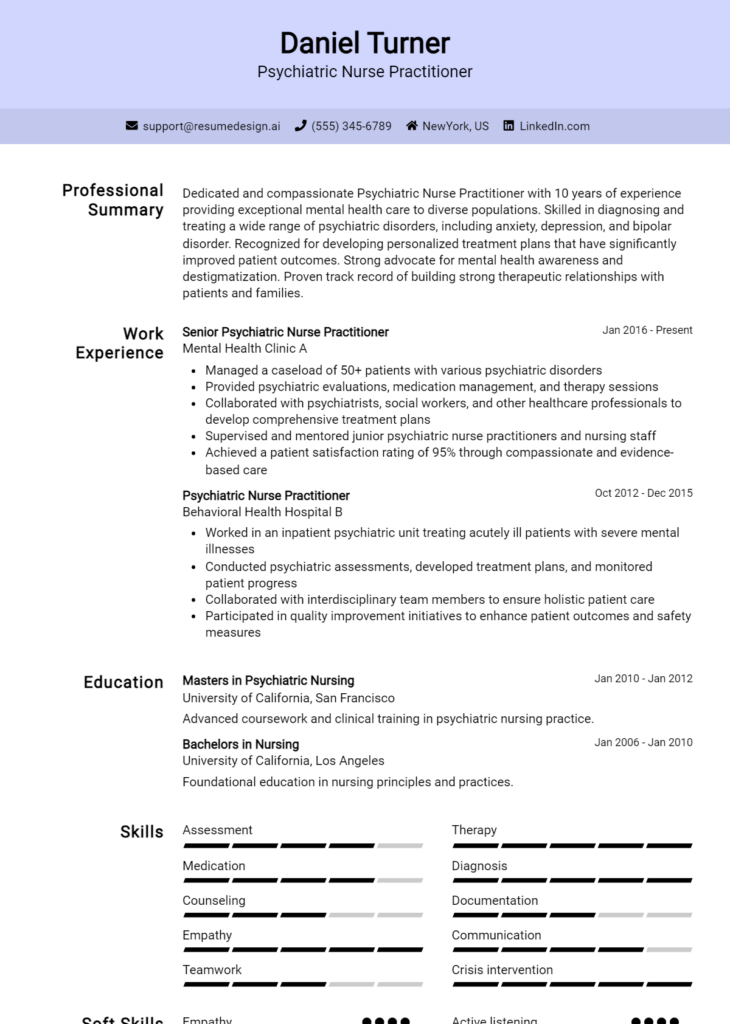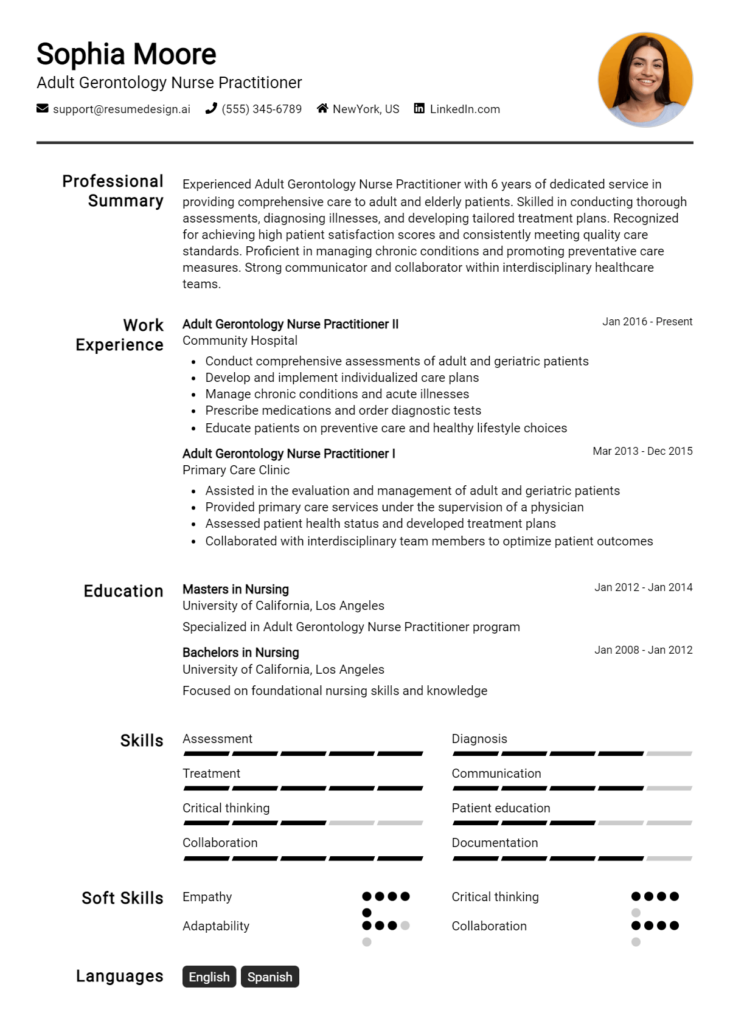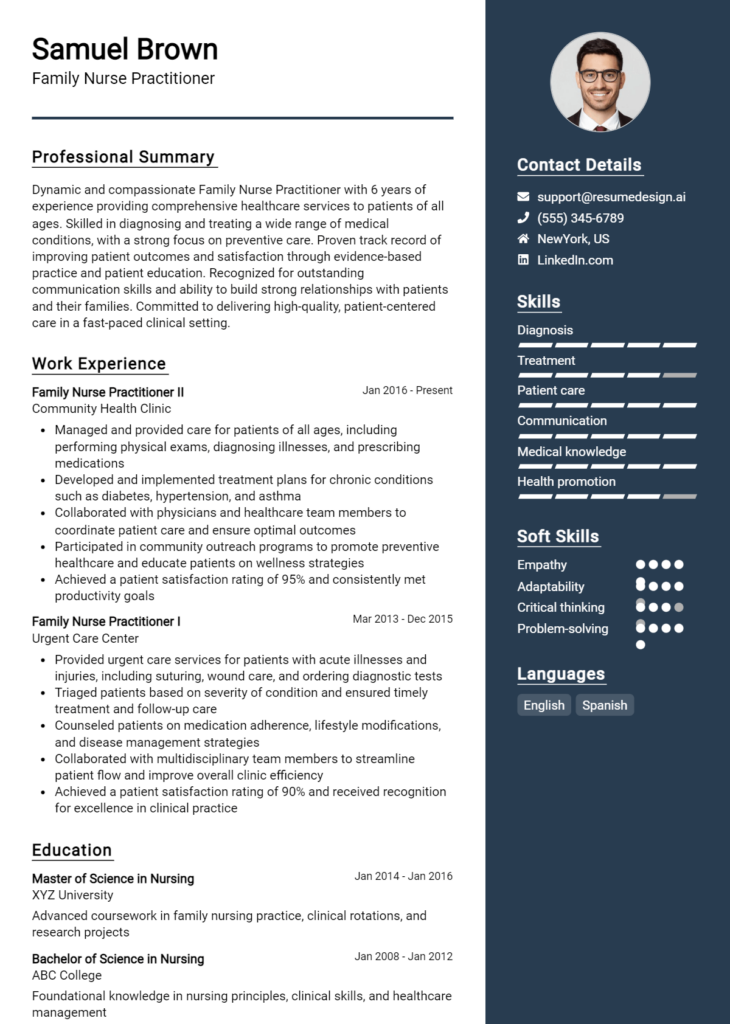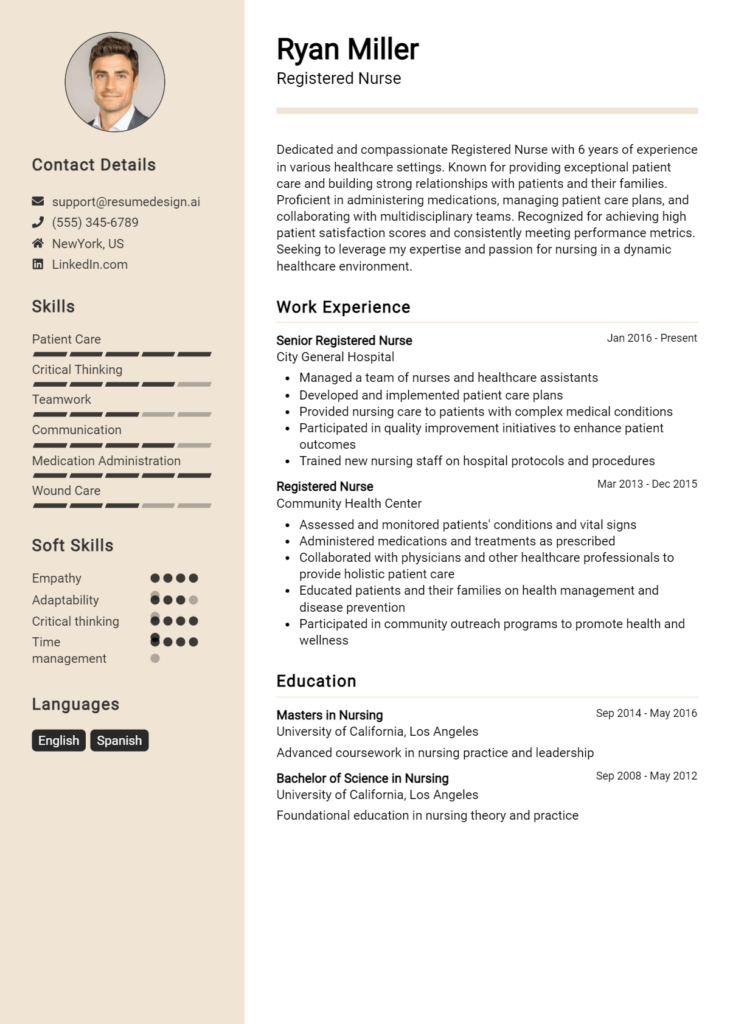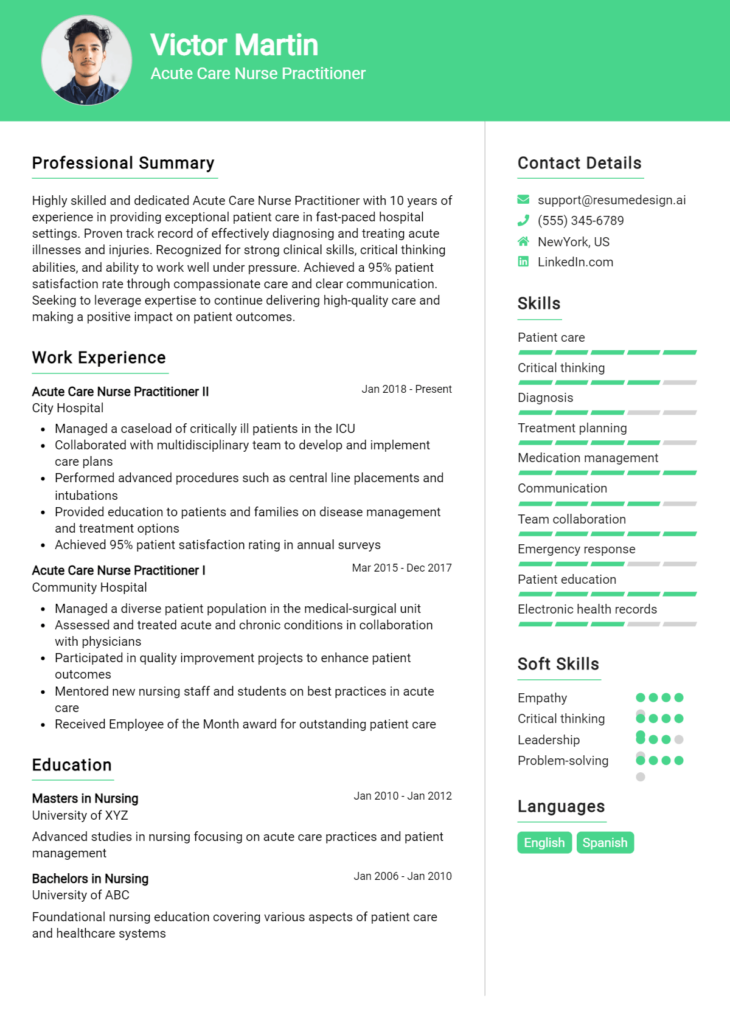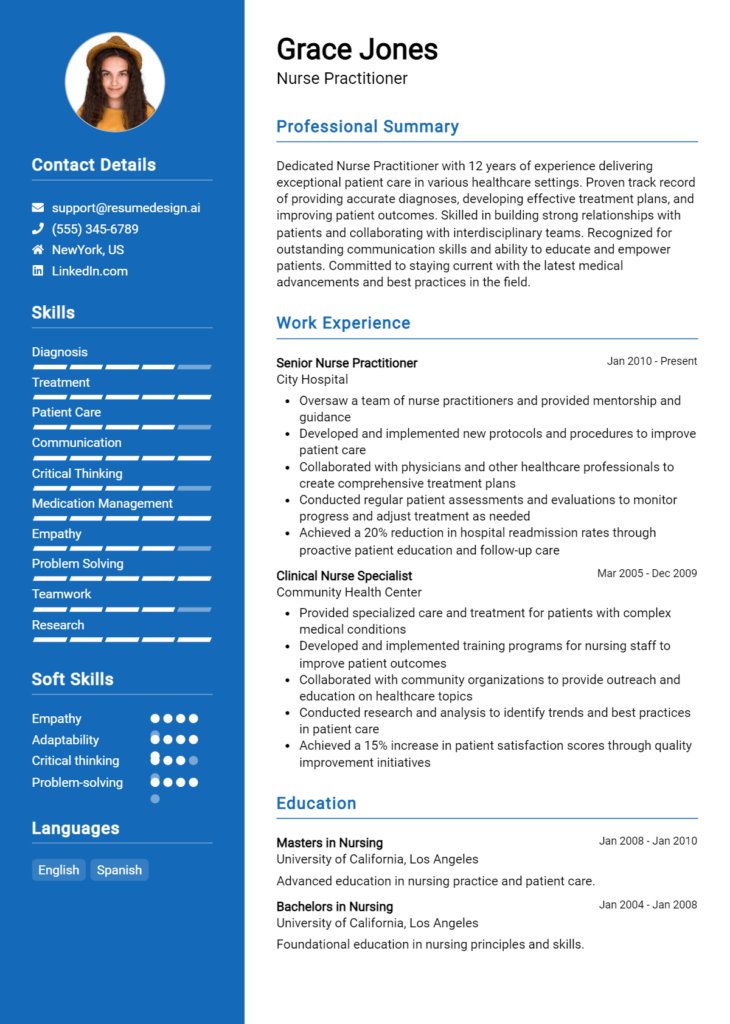Long-Term Care Nurse Core Responsibilities
A Long-Term Care Nurse is pivotal in delivering compassionate and comprehensive care to patients with chronic illnesses or disabilities. Key responsibilities include assessing patient needs, developing care plans, administering medications, and coordinating with various departments to ensure holistic care. Essential skills encompass technical proficiency, operational efficiency, and strong problem-solving abilities, vital for addressing complex patient conditions. These competencies not only enhance patient outcomes but also align with the organization's overarching goals, making a well-structured resume crucial for showcasing these qualifications effectively.
Common Responsibilities Listed on Long-Term Care Nurse Resume
- Conducting comprehensive patient assessments
- Creating and implementing individualized care plans
- Administering medications and monitoring their effects
- Providing emotional support and education to patients and families
- Collaborating with interdisciplinary teams to improve care delivery
- Maintaining accurate patient records and documentation
- Monitoring vital signs and reporting changes in patient status
- Ensuring compliance with health regulations and policies
- Training and supervising junior nursing staff
- Participating in patient care meetings and rounds
- Managing care transitions and discharge planning
- Implementing infection control protocols
High-Level Resume Tips for Long-Term Care Nurse Professionals
In the competitive landscape of healthcare, a well-crafted resume is essential for Long-Term Care Nurse professionals seeking to make a lasting impression. Often, the resume serves as the first touchpoint between a candidate and potential employers, making it crucial to reflect not just skills but also significant achievements. A resume that effectively showcases your qualifications can set you apart from other applicants, highlighting your dedication and expertise in long-term care. This guide will provide practical and actionable resume tips specifically tailored for Long-Term Care Nurse professionals, helping you to present yourself as the ideal candidate.
Top Resume Tips for Long-Term Care Nurse Professionals
- Tailor your resume to the specific job description by incorporating relevant keywords and phrases that align with the role.
- Highlight your relevant experience, focusing on positions that directly relate to long-term care settings.
- Quantify your achievements with concrete numbers, such as the number of patients managed or improvements in patient care metrics.
- Showcase your industry-specific skills, including knowledge of patient care protocols, medication management, and regulatory compliance.
- Include certifications and training specific to long-term care, such as CPR, First Aid, and specialized nursing courses.
- Utilize a clear and professional format, ensuring your resume is easy to read and visually appealing.
- Incorporate a professional summary that succinctly outlines your experience, skills, and passion for long-term care nursing.
- Emphasize soft skills such as communication, empathy, and teamwork, which are vital in a long-term care environment.
- List any volunteer work or community service that demonstrates your commitment to patient care and community involvement.
By implementing these tips, you can significantly increase your chances of landing a job in the Long-Term Care Nurse field. A well-structured and focused resume not only showcases your professional qualifications but also reflects your commitment to providing quality care in long-term settings, making you a more attractive candidate to potential employers.
Why Resume Headlines & Titles are Important for Long-Term Care Nurse
In the competitive field of long-term care nursing, a well-crafted resume headline or title plays a pivotal role in capturing the attention of hiring managers. A strong headline can effectively summarize a candidate's key qualifications, showcasing their unique strengths in a concise and impactful manner. This brief yet powerful statement serves as a hook, drawing the reader in and encouraging them to explore the resume further. An effective resume headline should be relevant to the specific job being applied for, instantly communicating the candidate's professional identity and aligning with the needs of the employer.
Best Practices for Crafting Resume Headlines for Long-Term Care Nurse
- Keep it concise: Aim for a headline that is no longer than a single sentence.
- Be role-specific: Use keywords related to long-term care nursing to align with job descriptions.
- Highlight your strengths: Focus on your unique skills, experiences, or accomplishments.
- Use action words: Incorporate dynamic verbs that convey your proactive approach to nursing.
- Avoid jargon: Keep language clear and accessible to ensure it resonates with all readers.
- Tailor for each application: Customize your headline to match the specific requirements of the job.
- Include relevant certifications: Mention any pertinent qualifications or certifications that set you apart.
- Make it compelling: Use language that evokes interest and encourages hiring managers to learn more about you.
Example Resume Headlines for Long-Term Care Nurse
Strong Resume Headlines
Compassionate Long-Term Care Nurse with 5+ Years of Experience in Geriatric Care
Dedicated RN Specializing in Patient-Centered Care for the Elderly
Experienced Long-Term Care Nurse Committed to Enhancing Quality of Life for Residents
Proficient Long-Term Care Nurse with Expertise in Chronic Illness Management
Weak Resume Headlines
Nurse Looking for Job
Healthcare Professional
Strong resume headlines are effective because they provide a clear and immediate understanding of the candidate's qualifications, while also conveying a sense of professionalism and focus. They highlight specific skills and experiences relevant to long-term care nursing, making it easy for hiring managers to recognize the candidate's value. In contrast, weak headlines fail to impress because they lack specificity and do not communicate what the candidate brings to the table. Generic titles can leave hiring managers uncertain about the candidate's fit for the role, leading to missed opportunities for qualified professionals.
Writing an Exceptional Long-Term Care Nurse Resume Summary
A well-crafted resume summary is crucial for a Long-Term Care Nurse as it serves as the first impression to hiring managers. This brief yet impactful section can quickly capture attention by highlighting key skills, relevant experience, and notable accomplishments that align with the demands of the role. A strong summary should be concise, focusing on what makes the candidate uniquely qualified, while being tailored to the specific job description to resonate with the employer’s needs.
Best Practices for Writing a Long-Term Care Nurse Resume Summary
- Quantify your achievements: Use numbers to showcase your impact, such as patient outcomes or care improvements.
- Focus on skills: Highlight specialized skills that are particularly relevant to long-term care settings, such as patient assessment and collaboration.
- Tailor your summary: Customize your summary for each job application to reflect the specific qualifications mentioned in the job description.
- Be concise: Keep your summary brief, ideally between 2-4 sentences, ensuring that every word adds value.
- Use action verbs: Start sentences with strong action verbs that demonstrate your competencies and contributions.
- Showcase relevant certifications: Include any specific certifications or training that enhance your qualifications in long-term care.
- Emphasize patient-centered care: Highlight your commitment to providing compassionate and comprehensive care to residents.
- Reflect your professional ethos: Use language that conveys your dedication to quality care, teamwork, and ongoing professional development.
Example Long-Term Care Nurse Resume Summaries
Strong Resume Summaries
Compassionate Long-Term Care Nurse with over 7 years of experience in geriatric care, achieving a 95% patient satisfaction score through personalized care plans and effective communication with families.
Dedicated Long-Term Care Nurse with a proven track record of reducing hospital readmission rates by 30% through proactive patient monitoring and education, ensuring optimal health outcomes for residents.
Skilled in medication management and chronic disease care, I have successfully coordinated treatment plans for over 50 residents, resulting in improved health metrics and a 20% increase in overall resident well-being.
Licensed Long-Term Care Nurse with expertise in managing multidisciplinary teams and developing innovative care programs that enhanced patient engagement, leading to a 15% increase in resident participation in activities.
Weak Resume Summaries
Experienced nurse seeking a position in long-term care, looking to help patients and work with a team.
Nurse with some experience in long-term care, dedicated to providing good patient care and improving health outcomes.
The examples of strong resume summaries are considered effective because they provide specific achievements, quantify results, and directly relate to the role of a Long-Term Care Nurse. They showcase the candidate's unique qualifications and illustrate their impact in previous positions. Conversely, the weak summaries are vague, lack measurable outcomes, and do not convey any distinctive qualifications or skills, making them less appealing to hiring managers.
Work Experience Section for Long-Term Care Nurse Resume
The work experience section of a Long-Term Care Nurse resume is vital for demonstrating the candidate's qualifications and capabilities in a specialized healthcare environment. This section not only highlights the nurse's technical skills but also showcases their ability to manage teams and deliver high-quality care to patients. By quantifying achievements and aligning experiences with industry standards, candidates can effectively illustrate their value to potential employers, making it clear how their expertise contributes to superior patient outcomes and efficient healthcare delivery.
Best Practices for Long-Term Care Nurse Work Experience
- Utilize action verbs to begin each bullet point, emphasizing your contributions and impact.
- Quantify your achievements with specific metrics, such as patient satisfaction scores or reduction in medication errors.
- Highlight relevant certifications and specialized training that enhance your technical expertise.
- Showcase your experience in interdisciplinary collaboration, emphasizing teamwork with other healthcare professionals.
- Include examples of leadership roles or responsibilities you have undertaken within care teams.
- Tailor your experience to reflect the specific requirements and standards of the long-term care industry.
- Describe your contributions to process improvements or innovations in patient care.
- Use concise and clear language to ensure readability and impact.
Example Work Experiences for Long-Term Care Nurse
Strong Experiences
- Implemented a new patient care protocol that resulted in a 20% decrease in hospital readmissions over six months.
- Led a team of 10 nursing staff in a quality improvement initiative, achieving a 95% satisfaction rating from family surveys.
- Coordinated with interdisciplinary teams to develop individualized care plans, enhancing patient outcomes and compliance by 30%.
- Trained and mentored new nursing staff, which improved team efficiency by 15% within the first quarter of implementation.
Weak Experiences
- Responsible for patient care duties and daily tasks.
- Worked as part of a nursing team.
- Provided assistance to other staff members when needed.
- Helped patients with their daily activities.
The examples listed as strong experiences effectively convey measurable achievements and demonstrate leadership and collaborative skills, making them impactful and relevant to potential employers. In contrast, the weak experiences lack specificity and quantifiable outcomes, failing to illustrate the candidate's true capabilities or contributions to patient care and team dynamics.
Education and Certifications Section for Long-Term Care Nurse Resume
The education and certifications section of a Long-Term Care Nurse resume is crucial as it provides a comprehensive overview of the candidate's academic background and professional qualifications. This section not only showcases the foundational knowledge acquired through formal education but also highlights industry-relevant certifications and ongoing learning efforts that are essential in the ever-evolving healthcare landscape. By detailing relevant coursework, specialized training, and certifications, candidates can significantly enhance their credibility and demonstrate their commitment to excellence in long-term patient care, aligning themselves with the specific requirements of the job role.
Best Practices for Long-Term Care Nurse Education and Certifications
- Include only relevant degrees and certifications that pertain to long-term care nursing.
- Detail specific coursework that demonstrates expertise in geriatric care, chronic illness management, and patient advocacy.
- Highlight advanced certifications, such as Certified Nursing Assistant (CNA) or Certified Clinical Nurse Specialist (CCNS), to showcase specialized skills.
- List any continuing education courses that reflect a commitment to lifelong learning and adaptation to new healthcare practices.
- Provide information on any specialized training in areas like dementia care, palliative care, or rehabilitation.
- Use clear formatting to make this section easy to read and navigate for potential employers.
- Tailor the education and certifications section to align with the specific requirements listed in the job description.
- Update this section regularly to reflect new qualifications and training received.
Example Education and Certifications for Long-Term Care Nurse
Strong Examples
- Bachelor of Science in Nursing (BSN), University of Health Sciences, 2020
- Certified Geriatric Nurse (CGN), National Certification Corporation, 2021
- Advanced Cardiac Life Support (ACLS), American Heart Association, 2022
- Coursework in Gerontology and Palliative Care, Online Certification Program, 2023
Weak Examples
- Associate Degree in General Studies, Community College, 2018
- Basic Life Support (BLS) Certification, 2015 (not updated)
- Certificate in Medical Billing and Coding, 2019 (not relevant to nursing)
- High School Diploma, 2010 (not sufficient for nursing roles)
The strong examples are considered effective because they directly align with the qualifications and skills required for a Long-Term Care Nurse, showcasing both higher education and relevant certifications that enhance the candidate's expertise in geriatric care. In contrast, the weak examples lack relevance to the nursing role, either due to outdated certifications or degrees that do not pertain to nursing, which could diminish the candidate's appeal to employers seeking qualified long-term care professionals.
Top Skills & Keywords for Long-Term Care Nurse Resume
In the competitive field of long-term care nursing, having a well-structured resume that highlights your skills is crucial. Employers seek candidates who not only possess the necessary clinical knowledge but also demonstrate strong interpersonal abilities. A resume that effectively showcases your skills can significantly enhance your chances of landing an interview. Both hard and soft skills play essential roles in providing quality patient care, fostering healthy relationships with patients and their families, and collaborating with healthcare teams. By emphasizing these skills, you can paint a comprehensive picture of your qualifications and readiness to tackle the challenges of long-term care nursing.
Top Hard & Soft Skills for Long-Term Care Nurse
Soft Skills
- Compassionate patient care
- Effective communication
- Team collaboration
- Empathy and emotional support
- Problem-solving abilities
- Patience and resilience
- Time management
- Attention to detail
- Adaptability to change
- Conflict resolution
Hard Skills
- Medication administration
- Wound care management
- Vital signs monitoring
- Patient assessment and evaluation
- Knowledge of healthcare regulations
- Electronic health record (EHR) proficiency
- Infection control practices
- Basic life support (BLS) certification
- IV therapy administration
- Care planning and coordination
By incorporating these essential skills into your resume, along with relevant work experience, you can demonstrate your comprehensive qualifications as a long-term care nurse, making you a standout candidate in the field.
Stand Out with a Winning Long-Term Care Nurse Cover Letter
Dear [Hiring Manager's Name],
I am writing to express my interest in the Long-Term Care Nurse position at [Facility Name], as advertised on [where you found the job listing]. With a compassionate approach to patient care and over [X years] of experience in nursing, particularly in long-term care settings, I am confident in my ability to provide high-quality care to residents while fostering a supportive and respectful environment. My dedication to enhancing the quality of life for individuals with chronic illnesses and disabilities aligns perfectly with the mission of [Facility Name].
Throughout my career, I have developed strong clinical skills that enable me to assess and manage the complex needs of long-term care patients effectively. My experience includes administering medication, coordinating patient care, and collaborating with interdisciplinary teams to create comprehensive care plans tailored to each resident’s unique needs. In my previous role at [Previous Facility Name], I successfully implemented a person-centered care approach that improved patient satisfaction scores by [X%]. This experience has equipped me with the ability to advocate for my patients and ensure they receive the highest standard of care.
Moreover, I pride myself on my ability to build meaningful relationships with patients and their families, which is crucial in long-term care. I understand the importance of communication and empathy in fostering trust and cooperation, especially when dealing with sensitive health issues. My approach is always patient-centered, ensuring that I listen to their concerns and preferences while involving them in their care decisions. I am excited about the opportunity to bring my skills and passion for nursing to [Facility Name] and contribute to the well-being of your residents.
Thank you for considering my application. I look forward to the opportunity to discuss how my experience and dedication can benefit the residents of [Facility Name]. I am eager to bring my expertise in long-term care nursing to your esteemed facility, and I hope to contribute positively to your team.
Sincerely,
[Your Name]
[Your Contact Information]
Common Mistakes to Avoid in a Long-Term Care Nurse Resume
When crafting a resume for a Long-Term Care Nurse position, it's vital to avoid common pitfalls that could undermine your chances of landing an interview. A well-structured resume not only showcases your qualifications and experience but also reflects your understanding of the role’s unique demands. Here are some frequent mistakes that candidates often make, which can detract from the overall effectiveness of their resumes:
Neglecting to Tailor the Resume: Sending out a generic resume without customization for the specific job can make it seem like you're not genuinely interested in the position. Always align your skills and experiences with the job description.
Using Jargon or Technical Terms: While it's important to demonstrate your expertise, overloading your resume with medical jargon can alienate hiring managers who might not be familiar with specific terms. Aim for clear, accessible language.
Listing Responsibilities Instead of Achievements: Simply stating duties performed in previous roles doesn't convey your impact. Focus on specific achievements and outcomes that demonstrate your effectiveness as a nurse.
Ignoring Formatting and Design: A cluttered or overly complicated resume can distract from your qualifications. Use a clean, professional format with consistent fonts and clear headings to enhance readability.
Overloading with Irrelevant Information: Including unrelated work experience or outdated certifications can dilute your resume's impact. Keep your content relevant to long-term care nursing and recent enough to be pertinent.
Failing to Highlight Soft Skills: Long-term care nursing requires strong interpersonal skills. Neglecting to mention attributes like empathy, communication, and teamwork can leave hiring managers questioning your fit for the role.
Omitting Important Certifications or Licenses: Forgetting to list essential credentials, such as your RN license or specialized certifications in geriatrics, can be a major oversight. Always make these qualifications prominent.
Neglecting to Proofread: Spelling and grammatical errors can create a negative impression. A resume riddled with mistakes suggests a lack of attention to detail, which is crucial in nursing roles. Always review your resume carefully before submission.
Conclusion
As a Long-Term Care Nurse, your role is vital in providing compassionate and comprehensive care to patients who require ongoing support due to chronic illnesses or disabilities. Throughout this article, we have explored various aspects of this rewarding profession, including essential skills such as patience, empathy, and effective communication. We also highlighted the importance of continuous education and staying updated on best practices to ensure the highest quality of care for your patients.
In addition to clinical expertise, your resume plays a crucial role in showcasing your qualifications and experiences to potential employers. It is essential to present a well-structured and tailored resume that reflects your unique skills and the specific requirements of the long-term care nursing field.
If you’re looking to enhance your resume and stand out in the competitive job market, we encourage you to take advantage of various resources available to you. Check out our resume templates to find a design that suits your professional style. Use our resume builder for a step-by-step guide to create a polished resume that highlights your strengths. Explore our resume examples for inspiration tailored to the long-term care nursing sector. Lastly, don’t forget to craft a compelling cover letter using our cover letter templates to further impress hiring managers.
Take charge of your career today by reviewing and refining your Long-Term Care Nurse resume. Your dedication to providing exceptional care deserves to be highlighted effectively!

